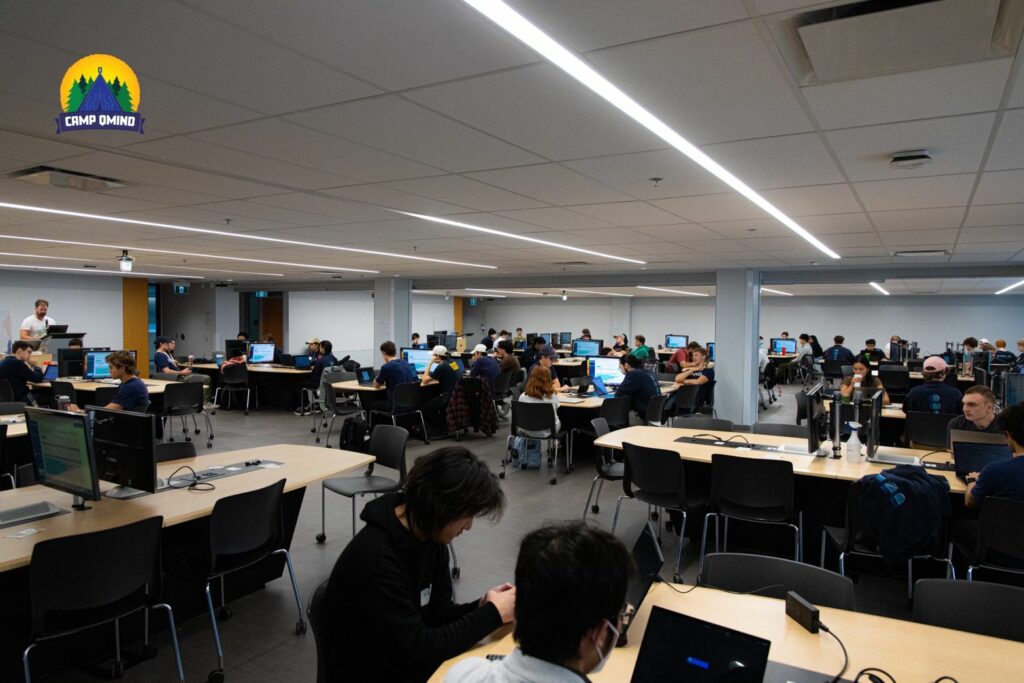QSC was proud to sponsor a lunch for all attendees of CAMP QMIND

At Queen’s School of Computing, it is part of our mission to support students both inside and outside the classroom. Queen’s is proud to house some of the largest, most active student-lead computing organizations in the country that help students establish unique connections and gain valuable experiences that can truly change their lives.
QMIND (Queen’s University Artificial Intelligence, Machine Learning, and Disruptive Technologies) is Canada’s largest undergraduate Al and machine learning organization with over 200 members and more than 30 design teams. This November, QSC was proud to sponsor a lunch for all attendees of CAMP QMIND, an annual member launch event brings all members together for a weekend of learning and team building activities. We asked the current Co-Presidents of QMIND Olivia Xu, Spencer Hill, and Gonzalo Soto about what makes QMIND a truly unique organization.
Here’s what they had to say:
What unique opportunities does QMIND provide that drives so many students to join your organization?
At QMIND, our goal is to provide experiential learning on AI and disruptive technologies to all undergraduate students. By joining QMIND, students will have the opportunity to work with a small design team on a project of their interest or a pro bono client project. Throughout the span of their projects, our Educate team and Directors of Design will bring various workshops and resources prepare our students with the technical knowledge needed for their projects. QMIND has a very strong network in the tech industry, which allows us to also provide our students with numerous professional development opportunities to help them succeed in a career in tech.
QMIND is open to all undergraduate students. Roughly, what percentage of QMIND students are from School of Computing? Do School of Computing students bring important background knowledge/experience to their design teams?
We strive for a diversity of faculties and background, of which the School of Computing represents approximately 35% of our over 200 members. Computing students bring many skills to design teams, particularly their background working in teams and knowledge of fundamental Computer Science topics. We find that the background in a variety of programming languages and frameworks that most computing students bring to the table are invaluable assets to design teams, of which many members have only been exposed to basic Python.
Tell us about Camp QMIND’s Artificial Intelligence Hackathon – what did it entail and what positive feedback you’ve received from participants?
Camp QMIND’s AI hackathon tasked groups of 4-5 students with the challenge of creating, from scratch, a model capable of categorizing images of different types of footwear. A basic, but educational, first AI project for many students, this problem was made more difficult (for advanced teams) by augmenting the dataset to encourage more robust and creative solutions. Teams worked with one Project Manager (an experienced QMIND member) and was the first exposure many members had to AI at all. We had many successful teams, where the winners were provided with either merchandise or gift cards for their efforts. During the hackathon we had QMIND exec and past members supervising and mentoring the teams to aid them in the process.
When students join extracurricular club like QMIND, they are hoping to form life-long connections and friendships, and to create memories. What does your team do to foster a diverse, inclusive, and welcoming environment for all?
We host a mandatory pre-hiring EDII workshop with all QMIND executives covering all topics that could impact the process, such as bias, racism, and segregation. Following that is a post-hiring EDII workshop where we onboard all members and hear about their expectations for the year to come. Throughout the school year, our EDII team writes newsletters highlighting important cultural events and stories of success from under-represented minorities within the tech industry. The EDII team also organizes community building events that connects minority students, such as women Coffee and Code.
Queen’s School of Computing was proud to sponsor a catered lunch for Camp QMIND. How much value to sponsorships add to the student experience at QMIND? What future initiatives are you planning for students that rely on sponsor support?
The catered lunch was a great value add to our students’ experience at Camp QMIND and made them very excited about future events at QMIND. The sponsorship also allowed us to allocate more money towards technical equipments such as EEG machines and compute power. A future initiative that may require sponsorship is our March conference, the Canadian Undergraduate Conference on AI (CUCAI). This is where all our design teams as well as teams from universities across Canada come together and present their work to a large group of industry representatives and engage in workshops with our industry partners.